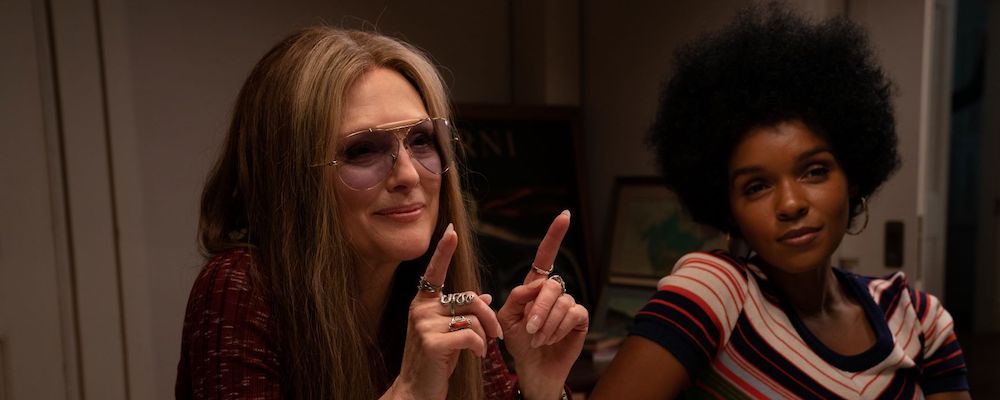‘The Glorias’ Details the Remarkable Work and Relatable Struggles of Feminist Icon Gloria Steinem
Sandra Miska
Gloria Steinem, the face of second-wave feminism, gets the biopic treatment with Julie Taymor’s “The Glorias.” Four different actresses, including Julianne Moore and Alicia Vikander, play the activist at different stages in her life, and the result is a feature that takes this titan of the women’s movement and brings her down to earth, exploring her extraordinary journey and the choices she made that helped her stand out.
Based on Steinem’s autobiography “My Life on the Road,” “The Glorias” traces her life from childhood to present day. One thing that is extraordinary about Steinem is perhaps just how ordinary her upbringing was. As a child in Ohio, Gloria (Ryan Kira Armstrong), who grew up with her parents and an older sister, adored her father, Leo (Timothy Hutton). Likewise, Leo loves his family, but his capricious nature and business failure cause his wife, Ruth (Enid Graham), much pain and heartache.
Later, as a teenager, Gloria (now played by Lulu Wilson), comes to better understand her mother, who gave up her career as a journalist to raise a family. Now grappling with mental illness, Ruth increasingly relies on her younger daughter, who we see repeatedly being torn between her familial obligations and fulfilling her dreams. Gloria’s upbringing sets the tone for the rest of her life. While many of her critics have accused her and other feminists of hating men, the reality couldn’t be further from the truth. While she never shows resentment towards Leo, Gloria looks at her mother as a cautionary tale; women seem to get the short end of the stick when it comes to matrimony.
There is one man in particular who impacted Steinem’s life above all others, and that is Dr. John Sharpe (Tom Nowicki), the British physician to whom she dedicated her book. In a pivotal scene, we see Gloria (Vikander), just out of college, go to Sharpe for an abortion in London. This meeting between doctor and patient before the procedure was already depicted in the limited series “Mrs. America,” but it’s such a defining moment in Gloria’s life that we can forgive the overlap. Before he agrees to the abortion, Sharpe tells Gloria that she must promise to do what she wants with her life. She takes this to heart, and we see her travel solo throughout India, learning from the women there, before starting her journalism career in New York.
Like so many women before her, Gloria traveled to New York with dreams of a successful and fulfilling career, and we see here how she “made it.” It’s a journey that’s truly inspiring to watch unfold, as there were probably thousands of women just as intelligent and educated as Steinem who gave up and resigned themselves to being homemakers. Vikander and Taymor do a great job of showing how her tenacity and strong-willed nature set her above the pack. Gloria also has a knack for knowing when to blend in and observe, something we see her do when she infiltrates the NYC Playboy Club, going undercover as a Bunny server in order to write her infamous article about the club’s sexist work environment.
But the biggest turning point comes when Gloria decides to step out from behind the typewriter and speak at feminist rallies, and she is super relatable as she works to successfully overcome her fear of public speaking. The title “The Glorias” can be interpreted to mean not only Steinem herself at different stages of her life, but also to the other activists she worked closely with, including many who never got their due. Most people are aware of U.S. Representative Bella Abzug (Bette Midler), but less is know about a lot of the other trailblazing women Taymor spotlights, including Black activist Dorothy Pitman Hughes (Janelle Monáe) and Florynce Kennedy (Lorraine Toussaint), as well as Wilma Mankiller (Kimberly Guerrero), the first woman elected as chief of the Cherokee Nation. The latter becomes a lifelong friend of Gloria’s, who also had an interesting relationship with Dolores Huerta (Monica Sanchez), the co-founder of the National Farmworkers Association who disagreed with Gloria on one key issue during the height of the women’s liberation movement.
Moore, who plays Gloria from around age 40 to present day, is full of wisdom as the icon continues to fight, looking back at her life with younger versions of herself. Like most women, she takes time to reflect on her work and some of her choices, but unlike most women, she has loads of people, both admirers and critics, circling around and weighing in on her legacy.
Throughout the film, we see Gloria traveling by bus, and for her last stop, Taymor picks a fitting location, the 2017 Women’s March in D.C. It’s a perfect reminder that her work is far from done, and the fight will continue thanks to the generations of women whom she and the other “Glorias” have inspired.
“The Glorias” begins streaming Sept. 30 on Amazon Prime Video.

